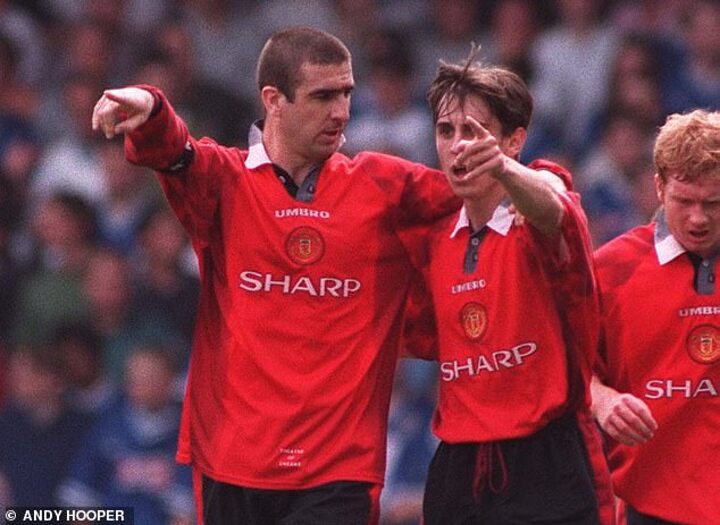Gary Neville has warned football runs the risk of driving characters out of the game – and believes his former Manchester United team-mate Eric Cantona would have been a victim.

Cantona famously moved to United after falling out with managers in France, winning the First Division with Leeds and then running into problems with his boss Howard Wilkinson.
He came with a somewhat negative reputation but went on to inspire United to their first title in more than a quarter of a century.

Footballers have faced criticism for their actions during lockdown and Neville believes the likes of Cantona would have hit out at the requirements required of players these days.
Neville told the Sky Sports Football Show: 'We always talk about characters and personalities – people who do things differently. We thrive on that, it would be boring if you had the same stuff in interviews.
'We like characters but it happens less because of the importance of professionalism.

'In the 1990s, it was still allowed that you could go out for a drink. It wasn't the idea that you were superstars, you were footballers but there was still a connection with the man in the pub. That's become detached and players are now athletes, every time they put a foot wrong [they are criticised].
'People like [Eric] Cantona would've flouted lockdown rules. They're mavericks, they do what they want, they want freedom. What we expect from football players now, we don't allow that anymore – it's not tolerated.
'The mavericks of the game are being weaned out because of behaviours.'
Cantona won the Premier League four times with United, despite his 'maverick' behaviour.

And Neville was quick to point out how United had benefitted from taking on someone who was regarded as being 'difficult' – and how players around him improved because of his character.
He continued: 'Cantona had this reputation of being difficult, Leeds let him go, why would they let him go?
'He had been kicked out of France, you're expecting this person who was going to blow up, it never happened, in the dressing room his professionalism was unbelievable.
'He always turned up in the big moments, that was what I remembered, the big moments in the big matches when the game was on a knife-edge, the amount of times he scored the big goal, for me always turned up when it mattered, that was the thing about him.

'He retired in such a way where he just disappeared and said, "I'm gone". The Kung Fu kick goes down in folklore, things like that were there, but in the changing room, he was quiet and led by example.
'Those eyes looking at you if you played the wrong pass, those were things that were important to him.'
Cantona famously had a different approach to the press, not least after avoiding a prison sentence for kicking a fan in the chest.
He told the assembled media in 1995: 'When seagulls follow the trawler it is because they think sardines will be thrown into the sea'.
Up and coming striker Erling Haaland was criticised for an interview that went viral on social media where he seemed to be avoiding giving long answers.
And Neville sees comparisons between the Borussia Dortmund star and his old team-mate: 'Who's the character in football now?

'I saw Haaland did an interview where he was a bit arrogant and awkward and everyone was quick to have a go and shut him down.
'A 19-year-old who shows confidence, "He should have more respect". But I want to see someone develop into the character they are, I want to see the flawed genius.
'I was boring as hell, no one wanted to be a Gary Neville! You want to see people like Cantona who express themselves differently, we're drumming it out of players.
'You look at the statues outside Old Trafford, three great players but all very different. Dennis Law very short in his replies, quirky and arrogant quiet. [Bobby] Charlton almost like perfection, and [George] Best, the maverick.
'That's what makes a dressing room – these types of characters mixing with each other.
'The minute a player does something different, we're jumping down their throats. We have to be careful not to become our own enemy.'
